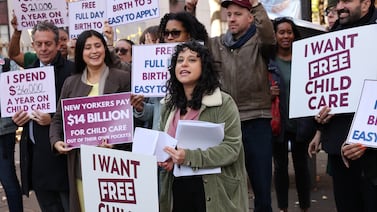When the coronavirus crisis closed campuses in the spring, school boards across the country found themselves faced with decisions they never anticipated making: how to move schools online overnight, how to engage with children without computers or reliable internet, how to reopen buildings and ensure social distancing in once-cramped classrooms, and how to pay for the technology that schooling in the age of COVID-19 demands.
As boards mulled these weighty questions, the national organization representing them got a new leader: Anna Maria Chávez, a former Girl Scouts CEO. She became the chief executive of the National School Boards Association, which lobbies on behalf of school boards representing 13,000 districts, in June.
The association has been pushing for additional coronavirus relief, more federal funding for special education, and a pathway to citizenship for immigrant students. And amid a pandemic that brought educational disparities into sharp relief, NSBA is calling for the creation of a presidential task force on equity in education and for Dr. Jill Biden, a veteran educator and the next first lady, to lead it.
“The move to remote learning has shown us that our educators are incredibly innovative and resourceful in how they teach our students,” Chavez said. “But when you’re neurodiverse, disabled, or don’t have access to the internet, the move online can be devastating.”
Chávez spoke recently with Chalkbeat as part of our How I Lead feature. This interview has been lightly edited for length and clarity.
What unexpected issues have come up for school boards and their members amid the coronavirus crisis?
COVID-19 has made very clear that many communities across the U.S. rely on our schools for much more than education. Schools have shouldered the burden of a lot of inequality in our society – providing students with meals and internet access.
Every problem facing our communities makes its way through the schools’ front doors, and COVID is a wake-up call that we need support from the community at large and the federal government so that we can focus on our primary mission: helping our future generations succeed.
Are you seeing boards and their members rise to the occasion? If so, how so?
We have watched in awe as our school boards work creatively and tirelessly to protect our students’ access to the institution that is the greatest equalizer in our society – our public education system. We’ve seen buses repurposed as portable broadband hotspots; we’ve also seen front-line staff go knock on doors to ensure students have what they need to succeed in school — whether that is a device or a meal.
It’s humbling, but, to be honest, it’s also very frustrating, because at the same time our school boards are doing everything they can do to defend our students’ right to an education, the federal government isn’t stepping up with the funding and support that boards and 50 million American public school children need.
When did you know that COVID would change this nation’s educational landscape? Do you think any of the COVID-era changes to districts and schools will outlast the pandemic?
The moment even one school closed its doors and went virtual, we knew that we were going to have to fight hard for each and every one of our students because they are all different — with different needs, different resources, and different home lives.
The move to remote learning has shown us that our educators are incredibly innovative and resourceful in how they teach our students. But when you’re neurodiverse, disabled, or don’t have access to the internet, the move online can be devastating. Not to mention the strain on families and parents who are trying to help their children at the same time they may be juggling other children, their jobs, and the stress of an unrelenting pandemic.
I hope that we find ways to bring the innovation in educational technology that we’ve seen during the pandemic to end the digital divide once and for all.
Tell us about your own experience with school and how it affects your work today.
I grew up in rural Arizona with a grandmother who taught me to never take for granted my access to education because she hadn’t received her own and a mother who served as a local elected official during a time when you didn’t see a lot of women of color in these positions. So although I didn’t really have that many resources available to me, what I did have was mentors who kicked down barriers for me.
I realized very early on that we’re not all given the same things to help us succeed, which is perhaps what drew me to tackling educational inequity. But I also realized something else: When we act as role models, when we step up as leaders and we say to the kids around us that we know they can be leaders, too, it makes all the difference.
What does a typical day look like for you now?
The biggest change is that I don’t have a typical day anymore. I was a night person, but throughout the pandemic I’ve become an early morning person, too. So much has changed in the last six months: I have lived in two different states, moved my son into college, and started a new leadership role in an industry that has transformed overnight.
My day usually consists of virtual meetings with staff who I haven’t had the chance yet to meet in person due to COVID. Each day is different, but the common thread is that I get to talk to so many people around the country who are passionate about providing an excellent education to America’s 50 million public school students.
Any New Year’s resolutions you’re willing to share?
To meet my staff in person and to thank them for their hard work during this historic moment! This pandemic made me appreciate the little things and calibrate my focus on the things that are important.
What’s the best advice you ever received — and how have you put it into action?
My grandmother gave me the best advice when she told me not to take everything personally — to focus on the issue at hand. When you’re beginning your career in your 20s and 30s, there’s a tendency to take feedback personally.
As I’ve moved further along professionally, I really grasped what she meant. It doesn’t mean not taking your work seriously or that it’s less important, but that there’s only so much within your control. And as a leader you have to figure out what are the most critical issues to focus on and where you can have the most impact. Feedback is a gift, but you have to take it from people who want you to succeed.







